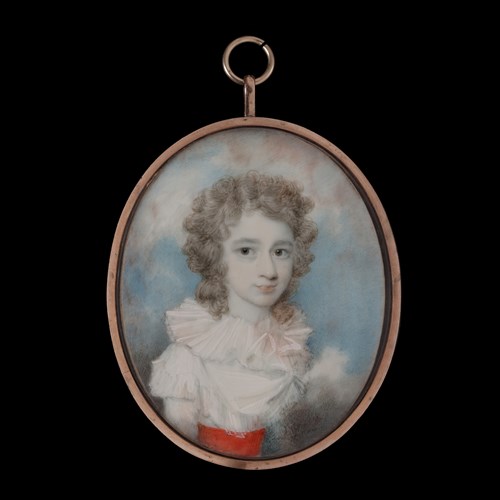Marketplace
Portrait miniature of a Young Gentleman wearing a black dress coat with a high collar and black waistcoat, a white shirt and cravat
JOHN COX DILLMAN ENGLEHEART
Portrait miniature of a Young Gentleman wearing a black dress coat with a high collar and black waistcoat, a white shirt and cravat
The Limner Company : Portrait Miniature
Date Circa 1824
Medium Watercolour on ivory
Dimension 5.1 cm (2⁰/₁ inches)
This portrait miniature is typical of the output of John Cox Dillman Engleheart, nephew to one of the most successful and prolific miniaturists of the previous generation, George Enleheart (1750-1829). John was his uncle’s pupil and alongside Thomas Richmond (1771-1837), also a cousin. He later became his assistant.
Gone are the sky backgrounds of the high Georgian period, which his uncle exemplified. Instead, we often see, as here, dark, anonymous backgrounds with the sitter spotlighted. This example echoes the intense, almost gothic quality found in his remarkable self-portrait circa 1810, now at the National Portrait Gallery [NPG 2754]. The darkness that surrounds the sitter - now known only by the initial ‘W’ engraved on the case - increases a sense of intimacy as the viewer has the sense of being secluded with him. This is further enhanced by the artist’s intimate focus on the young man, with him appearing very close to the picture plane and occupying nearly the entire height of the oval portrait. As was typical of Engleheart, the present work is signed on the reverse.
The gold locket frame in which it is house also alludes to the private and personal nature of this miniature, which would clearly have been worn by the intended recipient. The locket has also protected the miniature from fading, and the miniature remains well preserved.
Engleheart had studied at the Royal Academy Schools from 1800 and exhibited at the Academy throughout his career, between 1801-28. He is thought to have set up an independent practice as early as 1807 and lived for some time in Birmingham before travelling widely on the continent. He retired from miniature painting circa 1828.
Gone are the sky backgrounds of the high Georgian period, which his uncle exemplified. Instead, we often see, as here, dark, anonymous backgrounds with the sitter spotlighted. This example echoes the intense, almost gothic quality found in his remarkable self-portrait circa 1810, now at the National Portrait Gallery [NPG 2754]. The darkness that surrounds the sitter - now known only by the initial ‘W’ engraved on the case - increases a sense of intimacy as the viewer has the sense of being secluded with him. This is further enhanced by the artist’s intimate focus on the young man, with him appearing very close to the picture plane and occupying nearly the entire height of the oval portrait. As was typical of Engleheart, the present work is signed on the reverse.
The gold locket frame in which it is house also alludes to the private and personal nature of this miniature, which would clearly have been worn by the intended recipient. The locket has also protected the miniature from fading, and the miniature remains well preserved.
Engleheart had studied at the Royal Academy Schools from 1800 and exhibited at the Academy throughout his career, between 1801-28. He is thought to have set up an independent practice as early as 1807 and lived for some time in Birmingham before travelling widely on the continent. He retired from miniature painting circa 1828.
Date: Circa 1824
Medium: Watercolour on ivory
Signature: Signed on the reverse.
Dimension: 5.1 cm (2⁰/₁ inches)
Provenance: Brian and Judy Harden Antiques, 23 March 2006
Private Collection, UK.
Plus d'œuvres d'art de la Galerie





, facing right in gilt-studded armour, lace cravat and w_T638670356281946917.JPG?width=500&height=500&mode=pad&scale=both&qlt=90&format=jpg)



, facing right, in a blue coat, with a white waistcoat and cravat_T638865290871135706.JPG?width=500&height=500&mode=pad&scale=both&qlt=90&format=jpg)